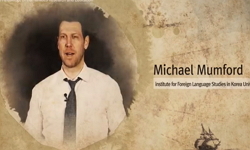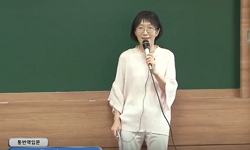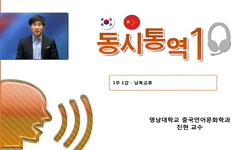In the history of Korea, and also in the history of various discourses such as those of the sciences and literature, the Japanese occupation in 1910 is a big turning point. The discourse system before this turn and the system after it can be contraste...
http://chineseinput.net/에서 pinyin(병음)방식으로 중국어를 변환할 수 있습니다.
변환된 중국어를 복사하여 사용하시면 됩니다.
- 中文 을 입력하시려면 zhongwen을 입력하시고 space를누르시면됩니다.
- 北京 을 입력하시려면 beijing을 입력하시고 space를 누르시면 됩니다.

An Archaeology of the Human Sciences in Korea : With Some Thoughts about Translation in Early Twentieth–Century Korea
한글로보기https://www.riss.kr/link?id=A100401163
-
저자
NAWATA, Yûji (Chuo University)

- 발행기관
- 학술지명
- 권호사항
-
발행연도
2014
-
작성언어
English
- 주제어
-
KDC
001
-
등재정보
KCI등재후보
-
자료형태
학술저널
-
수록면
31-45(15쪽)
-
KCI 피인용횟수
0
- 제공처
- 소장기관
- ※ 대학의 dCollection(지식정보 디지털 유통체계)을 통하여 작성된 목록정보입니다.
-
0
상세조회 -
0
다운로드
부가정보
다국어 초록 (Multilingual Abstract)
In the history of Korea, and also in the history of various discourses such as those of the sciences and literature, the Japanese occupation in 1910 is a big turning point. The discourse system before this turn and the system after it can be contrasted with each other. The present paper attempts to apply to the Korean scenario two discourse theories for the analysis of historical turns. It should be emphasized that only exemplary insights are given here. The first theory is by Michel Foucault. His Order of Things analyzes the pivotal moment about 1800 and contrasts the discourse system of Europe of the 17th and 18th centuries with that of the 19th and 20th centuries. The world was understood in the former through a tabular scheme, as in an encyclopedia, but in the latter, the world was understood according to the time axis, as in human sciences. This contrast can be compared with the contrast of the Korean discourse systems before and after the Japanese occupation. In the former, besides Confucianism, the principle of the spatial comprehension of the world was dominant. However, in the latter, the comprehension of the world was according to the timeline through human sciences, which were introduced from the West and Japan. The second theory is by Friedrich Kittler. His Discourse Networks 1800/1900 analyzes the historical turn around 1900 and emphasizes the materiality of literary discourses post– 1900. The same can also be observed in the literature by the Korean Yi Sang, especially in the translation of his Japanese works into Korean.
목차 (Table of Contents)
- Ⅰ. Introduction
- Ⅱ. An Archaeology of the Human Sciences in Korea
- 1. The Korean Order of Things before the Introduction of Human Sciences
- 2. Introduction of Human Sciences to Korea
- Ⅲ. Translation in Early Twentieth-Century Korea
- Ⅰ. Introduction
- Ⅱ. An Archaeology of the Human Sciences in Korea
- 1. The Korean Order of Things before the Introduction of Human Sciences
- 2. Introduction of Human Sciences to Korea
- Ⅲ. Translation in Early Twentieth-Century Korea
- Ⅳ. Conclusion
- Works Cited
- Abstract
참고문헌 (Reference)
1 Nawata, Yûji, "Vergleichende Mediengeschichte: Am Beispiel deutscher und japanischer Literatur vom späten 18. bis zum späten 20" Fink 2012
2 Hyun, Theresa M., "Translation Policy and Literary/Cultural Changes in Early Modern Korea (1895–1921)" 4 (4): 191-208, 1992
3 Yi, Sang, "The Wings" Jimoondang 2001
4 Foucault, Michel, "The Order of Things: An Archaeology of the Human Sciences" Tavistock 1970
5 James Legge, "The I Ching" Dover Publications 1963
6 Umakoshi, Tôru, "The Establishment and Development of Korean Modern Universities: Study of Diffusion of University Model" University of Nagoya Press 1995
7 Yi, Sang, "The Compilation of Yi Sang’s Literature" Sakuhinsha 2006
8 Yi, Sang, "The Collected Poems of Yi Sang" Kashinsha 2004
9 Yi, Ik, "Seongho’s Selected Essays" Myungmun Dang 1982
10 Yi, Kyu–Gyeong, "Scattered Manuscripts of Glosses and Comments of Oju" Dongguk Munhwasa 1959
1 Nawata, Yûji, "Vergleichende Mediengeschichte: Am Beispiel deutscher und japanischer Literatur vom späten 18. bis zum späten 20" Fink 2012
2 Hyun, Theresa M., "Translation Policy and Literary/Cultural Changes in Early Modern Korea (1895–1921)" 4 (4): 191-208, 1992
3 Yi, Sang, "The Wings" Jimoondang 2001
4 Foucault, Michel, "The Order of Things: An Archaeology of the Human Sciences" Tavistock 1970
5 James Legge, "The I Ching" Dover Publications 1963
6 Umakoshi, Tôru, "The Establishment and Development of Korean Modern Universities: Study of Diffusion of University Model" University of Nagoya Press 1995
7 Yi, Sang, "The Compilation of Yi Sang’s Literature" Sakuhinsha 2006
8 Yi, Sang, "The Collected Poems of Yi Sang" Kashinsha 2004
9 Yi, Ik, "Seongho’s Selected Essays" Myungmun Dang 1982
10 Yi, Kyu–Gyeong, "Scattered Manuscripts of Glosses and Comments of Oju" Dongguk Munhwasa 1959
11 Hyun, Theresa M., "Refractions from the Horizon: Literary Translation in Korea during the Early Modern Period (1895–1940).”" 4 : 275-280, 1990
12 Yi, Sang, "Lingering Impressions of a Mountain Village: A Few Paragraphs from a Journal of Travels to Sŏngch’ŏn" Centre for the Study of Korea. University of Toronto
13 Nawata, Yûji, "Kultur–Begriff und Kulturwissenschaft in Japan – gestern und heute" 3 (3): 100-110, 2004
14 Yi, Sang, "Indefinite Hexahedron Architecture" 17 : 25-27, 1932
15 Kittler, Friedrich A., "Discourse Networks 1800/1900" Stanford University Press 1990
16 "DB of Korean Classics" Institute for the Translation of Korean Classics
17 "Cluster “Asia and Europe in a Global Context.” Encyclopedia Database" Heidelberg University
18 Yi, Sang, "Bird’s–Eye–View 3: Poem No. 4, Poem No. 5" Joseon Joongang Daily News 1934
19 Sugiura, Kôhei, "Asian Books, Characters, and Design:Sugiura Kôhei and His Asian Colleagues Talk" DNP Archives of Graphic Design 2005
20 Korea University, "About KU: The KU Spirit: Founding of the University" Korea University
21 Korea University, "A History of the First 70 Years of Korea University" Korea University Press 1975
동일학술지(권/호) 다른 논문
-
Hyeon Chae’s Growth as One of the Main Agents of Modern Translation
- 이화여자대학교 이화인문과학원
- PARK, Kyoung
- 2014
- KCI등재후보
-
Strange Freedom in Nietzsche and Beauvoir
- 이화여자대학교 이화인문과학원
- PARKER, Emily Anne
- 2014
- KCI등재후보
-
Transitional Selves and the Question of Class Consciousness
- 이화여자대학교 이화인문과학원
- CHANDRA, Nandini
- 2014
- KCI등재후보
-
Reactivating Theology within“In–between” Spaces toward a Korean Women’s Postcolonial Theology
- 이화여자대학교 이화인문과학원
- KIM, Soo–Youn
- 2014
- KCI등재후보
분석정보
인용정보 인용지수 설명보기
학술지 이력
| 연월일 | 이력구분 | 이력상세 | 등재구분 |
|---|---|---|---|
| 2028 | 평가예정 | 재인증평가 신청대상 (재인증) | |
| 2022-01-01 | 평가 | 등재학술지 유지 (재인증) |  |
| 2019-01-01 | 평가 | 등재학술지 선정 (계속평가) |  |
| 2017-12-07 | 학술지명변경 | 한글명 : Trans-Humanities -> 탈경계인문학Trans-Humanities |  |
| 2017-01-01 | 평가 | 등재후보학술지 선정 (신규평가) |  |
| 2016-12-01 | 평가 | 등재후보 탈락 (계속평가) | |
| 2014-01-01 | 평가 | 등재후보학술지 선정 (신규평가) |  |
| 2009-06-11 | 학회명변경 | 영문명 : Ewha Institute for Humanities: EIH -> Ewha Institute for the Humanities: EIH |




 RISS
RISS






